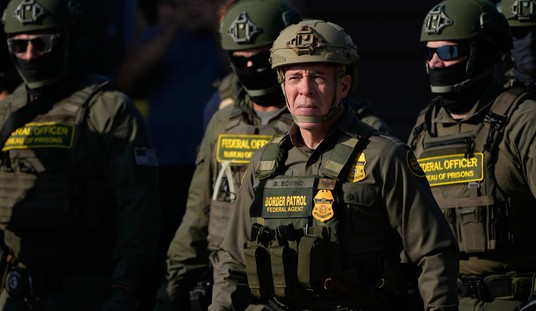How comforting to be blessed with a short memory. You can awaken each morning in the belief that the halcyon conditions that greet you as you go about your day have always existed, and that no effort or even thought need be expended to secure their continuance. Consider the city of New York, whose citizens (or at least a majority of its voters) seem to live under the shared delusion that the low crime currently seen across the five boroughs is simply the way things are, have always been, and always will be. How else to explain the election of Bill de Blasio?
In 1990, the first year of Mayor David Dinkins’s stewardship, New York City experienced its all-time record number of criminal homicides, a staggering 2,245. When Dinkins left office on New Year’s Eve, 1993, the total for that year was a slightly less horrifying 1,960.
But in 2013, through the efforts of the mayors who succeeded Dinkins, Rudy Giuliani and Michael Bloomberg, their respective police commissioners, and most importantly the men and women of the NYPD, the number was 335. This may be small comfort if someone close to you happened to be one of the 335, but New Yorkers today have all but forgotten the experience of passing two crime scenes on their way to the Subway and perhaps another after reaching their final stop. Through the late ‘80s and early ‘90s, if you showed up late for work and gave the excuse that there had been another murder on the D train, your boss wouldn’t have bothered to question it. When New Yorkers of a certain age refer to the “Dinkins days,” it is not a term of fond nostalgia.
And how will New Yorkers 25 years hence remember the “de Blasio days”? Relying on recent news, we might make a guess. The New York Post reported Thursday on the return of the “squeegee men,” those ubiquitous symbols of the dystopia into which New York City once descended. For those too young to remember, imagine being stopped at a traffic light and watching helplessly as some street urchin, someone you might smell before you can see, runs up and sprays some kind of liquid on your windshield, smears it around with a crumpled page of newsprint, then demands to be paid for his efforts. There was a time when you couldn’t emerge from a tunnel or exit a bridge into Manhattan without running into at least one of them.
But the squeegee men may be the least of New York’s crime problems. According to NYPD statistics, shootings in the city are up 10.3 percent for the year (PDF), and in the 28-day period that ended July 27, they were up 21 percent over the same time period last year. In the police precincts under the Brooklyn North command, shootings were up 52 percent for the same four-week period. And while the bad numbers are going up, the good ones are going down: the New York Post reported in June that gun seizures by NYPD officers were down by 10.2 percent for the year.
Which brings us back to Mayor de Blasio and the dilemma he now faces. In his campaign for office, Mr. de Blasio was openly dismissive, even contemptuous, of the “stop-and-frisk” tactics employed by the NYPD, i.e., the proactive policing measures to which an unquantifiable but surely significant portion of the decades-long drop in violent crime can be credited. A federal judge’s ruling in a lawsuit has ended stop-and-frisk (a legal travesty thoroughly explored by my friend Heather Mac Donald here and here), and the message now being tacitly transmitted to front-line police officers is: Don’t go out there and ruffle any feathers. If your actions result in controversy, your chain of command and your political leaders will not defend you.
A case in point is that of Eric Garner, the Staten Island man who died last month after struggling with NYPD officers trying to arrest him for illegal cigarette sales. In a video of the incident, Officer Daniel Pantaleo can be seen putting his arm around Garner’s neck, an action most often described, including by NYPD Commissioner William Bratton, as a “chokehold,” which is prohibited under department regulations. Officer Pantaleo has been removed from field duty and now awaits the next step in what will surely be a long ordeal.
Whether Garner was actually choked or for how long is impossible to determine from watching the video, and the cause of his death will be argued over by lawyers and medical experts in courtrooms for years to come. Garner’s autopsy revealed no injury to his neck or throat, but the medical examiner nonetheless declared the alleged chokehold was a contributing factor in the man’s death.
Any cop who watches the video recognizes the scenario as a familiar one. When police officers have made the decision that someone should be arrested, there are two very divergent courses the incident can take. In the first and most common of these, the cops say, “You’re under arrest,” the person to be arrested says, “Okay,” or perhaps utters an expletive but is nonetheless cooperative, the handcuffs are applied, and everyone goes off to the station for the paperwork. Had Mr. Garner chosen this option, he would have been taken to the station and given a Desk Appearance Ticket with instructions to appear in court at some future date. Today he would be alive, free, unknown beyond his neighborhood, and with no more stain on his character than that imposed by any of his previous 30 arrests.
But Mr. Garner did not make that choice. And when it became clear that he would resist arrest, as it had before any of the officers laid a hand on him, the officers themselves had a decision to make. They could walk away and say the hell with it, or they could use force to effect the arrest as the law authorizes. And to anyone who thinks there is some magical, nonviolent technique to arrest a man who is 6-3, 350 lbs., and who very much wishes not to be arrested, you’ve been watching too much television. Had no officer touched Mr. Garner’s neck, the sad result would likely have been the same. Mr. Garner, a man clearly not inclined toward exercise or a healthy diet, had a heart attack; he was not physically prepared for a wrestling match with a bunch of cops.
And now the questions for Mayor de Blasio and Commissioner Bratton. For all his tired, leftist blather, Mr. de Blasio surely knows that if crime in New York is allowed to escalate to anything close to the horrific levels of 25 years ago, he will rightly be regarded as a failure. Which is why he hired Mr. Bratton, a man whose reputation as a crime fighter is unmatched. But it is not only through fighting crime that Mr. Bratton has earned his reputation, but also, and perhaps just as importantly, through managing public perceptions of the police departments he has headed.
When Mr. Bratton became chief of the Los Angeles Police Department in 2002, he took over a department that had been demoralized through ten years of poor leadership. His magic was in reinvigorating cops on the street while at the same time fostering relationships with community leaders and people in the media. It was a balancing act he carried off for a time, until officers came to realize he would eagerly sacrifice one of their own if it suited his needs. The important thing to remember about Mr. Bratton – and if Mr. de Blasio does not know this already he soon will – is that every story has to be about him. From the moment he wakes up in the morning to the moment he falls asleep, every act he performs, every thought that runs through his head, every last firing of every last synapse, is dedicated solely to the cause of advancing his interests, and anyone who threatens them, be he a street cop or mayor of the city, must be made to suffer.
So now Mr. Bratton walks a narrow line. Arresting the recent uptick in New York’s violent crime will require officers to go out on the streets in the city’s troubled neighborhoods and confront criminals, the vast majority of whom are black and Latino. Some small percentage of those confrontations will be violent, even deadly. Every cop in New York, indeed every cop in America, knows he might find himself in Daniel Pantaleo’s position on the next radio call. If Mr. Bratton wants his cops to do what must be done to reverse the city’s recent rise in shootings, he cannot pretend that the arrest of Eric Garner was so aberrant as to warrant prosecution of any of the involved officers.
If Mr. Bratton heeds the calls from Al Sharpton and his acolytes to deliver Officer Pantaleo’s head on a pike, he may as well hang a “closed” sign on every precinct in the city, for every cop in town will know he could be next and avoid the types of confrontations that reduce crime but also expose his career to jeopardy.
Perhaps Mr. de Blasio can live with the thought of being remembered as a failure, but Mr. Bratton surely cannot. If Mr. Bratton is unable to motivate his officers to fight crime, either due to his own failures or to restrictions placed on him by the mayor, look for him to resign before he can be blamed for the bloodbath sure to follow.










Join the conversation as a VIP Member